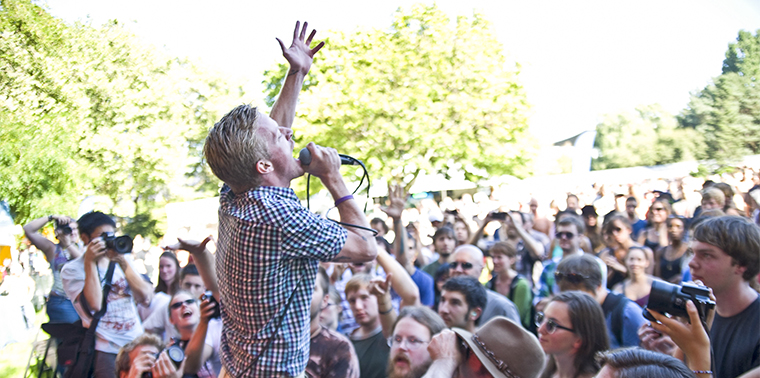June 1, 2015 — Thirty-three bands performing hip-hop, indie rock and more on six stages over three days is bound to draw attention under any circumstances — but perhaps nowhere more than as part of a major music festival. It’s no wonder that Clif Bar & Company chose SXSW this past March to launch what it hopes will become the biggest resource ever in the music industry for advancing sustainability: a program that pairs artists and nonprofit organizations to support causes they believe in.
The matchmaking program is the latest addition to the company’s packet of resources for performing artists known as GreenNotes, which also includes grants to help fund socially responsible initiatives and an online toolkit that provides advice on everything from the pros and cons of biodiesel to where to find sustainable merch. Originally targeted at environment-related causes, GreenNotes has grown in recent years to include justice issues such as homelessness and hunger as well.
“We launched Clif Bar GreenNotes to make it easier for musicians to make a positive change in the world,” says Thao Pham, vice president of community at Clif Bar & Company. “Many artists want to support worthy causes, but are either too busy trying to make a living or don’t know where to connect with nonprofits working on issues that matter to them. GreenNotes helps bridge that divide.”
The program, which is free for artists and nonprofits, works like an online dating service. Musicians interested in catalyzing change and nonprofit organizations in the business of doing just that fill out a simple form describing the cause that compels them — sustainable food, perhaps, or renewable energy — as well as other variables such as time, location and musical genre. An algorithm searches the database to find the best fit, then GreenNotes helps prospective partners connect. Working together, artists get a chance to make social change part of their brand while nonprofits get a chance to engage audiences beyond the usual suspects. The nonprofit might host a concert, for instance, drawing attention to its own cause while providing the performers valuable exposure around a cause they care about.
“[Artists] travel around the world and they see the destruction that is happening in the environment,” says Effect Partners CEO Michael Martin, who came up with the idea with Clif Bar founder Gary Erickson. At the same time, he adds, they have potential to be a valuable megaphone: With their built-in following and stage presence, they can amplify the voices of those trying to do something about climate change, food waste or other environmental issues.
“It’s a mutual give-get,” says Effect Partners creative director David Lewis. “[It’s good for] those artists that are looking to build a brand, that are looking to create change in the world, and those nonprofits looking for a road map and some new idea.”
Among the musicians who have participated in GreenNotes is alternative hip-hop artist Astronautalis, who took part in a video last year showcasing work by The Food Group, a Minneapolis-based regional food bank.
“The way they are thinking outside of the box when it comes to fighting hunger, it is exciting work, and I felt it needed to be shared with the world,” he says. “I am always inspired by people who dare to rethink old paradigms and work to find better ways of helping, creating and living, so any small amount I can do to bring that before more people, well, that is a thrilling thing to be a part of.”
Other initiatives to date from the matchmaking program include a grant to include messaging about healthier eating in a tour by indie musician and rapper Dessa sparked by Michael Pollan’s book The Omnivore’s Dilemma, and production of a music video documentary featuring homeless people singing rock band Stone Foxes’ “Goodnight Moon,” a song written from the perspective of someone falling asleep outside in the cold.
“GreenNotes gave us the opportunity to live out what we had been singing about,” says Stone Foxes’ Shannon Koehler. “I’ve always been passionate about writing lyrics [around] social justice issues, but as a band we had never taken the steps to act. This [project] gave our fans a picture and story about the people we need to help. ”
Lewis says that even though it’s early in the game, he’s pleased with the response to the matchmaking program to date, with more than three dozen artists and a hundred nonprofits signed on since the SXSW launch. He’s looking forward to further opportunities to bring key environmental messages through this innovative channel to people who might not otherwise engage.
“We have to be very patient and let it grow organically for it to be meaningful,” he says. “We’re eager to see it grow, but it’s about engagement, not size.”
![]()
Ensia shares solutions-focused stories free of charge through our online magazine and partner media. That means audiences around the world have ready access to stories that can — and do — help them shape a better future. If you value our work, please show your support today.
Yes, I'll support Ensia!
